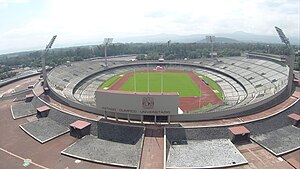1968 Summer Olympics / Athletics - 20 km walk (men)
|
|
|||||||||

|
|||||||||
| sport | athletics | ||||||||
| discipline | 20 km walk | ||||||||
| gender | Men | ||||||||
| Attendees | 34 athletes from 21 countries | ||||||||
| Competition location |
Estadio Olímpico Universitario (start / finish) |
||||||||
| Competition phase | October 14, 1968 | ||||||||
|
|||||||||
The men's 20 km at the 1968 Olympic Games in Mexico City was held on October 14, 1968. 34 athletes took part. The start and finish was the Estadio Olímpico Universitario .
Olympic champion was Volodymyr Holubnytschyj from the Soviet Union. He won in front of the Mexican José Pedraza and the Soviet goalkeeper Mykola Smaha .
While Julius Müller from the Federal Republic of Germany - officially Germany - was disqualified, all three starters from the GDR - officially East Germany - were able to place. Gerhard Sperling was fifth, Hans-Georg Reimann seventh and Peter Frenkel tenth. The Swiss René Pfister also reached the goal and was 23rd.
Walkers from Austria and Liechtenstein did not take part.
Existing records
| World best | 1:25:22 h |
Gennady Agapov ( Soviet Union )
|
Leningrad , Soviet Union (now Russia ) | July 21, 1968 |
| Olympic record | 1: 29: 34.0 h |
Ken Matthews ( Great Britain )
|
20km walk from Tokyo , Japan | October 15, 1964 |
World records are not set in street walking because of the different track conditions.
Conducting the competition
The athletes competed on October 14 at 4:50 p.m. ( UTC −6). There were no qualifying rounds.
Result
Date: October 14, 1968, 4:50 p.m.
The competition was characterized by constant changes in leadership. At kilometer five, the US walker Rudy Haluza led just ahead of Mykola Smaha and Volodymyr Holubnytschyj. Even the East German Hans-Georg Reimann, only a second back, was very close to the top. Smaha and Holubnytschyj led the field at ten kilometers, followed by Haluza, almost twelve seconds behind. Almost seven seconds behind, local hero José Pedraza was just ahead of the GDR walker Sperling. Smaha and Holubnytschyj were tied at the top even at fifteen kilometers. Her lead over her pursuer Haluza was 21 seconds, with Pedraza another twelve seconds behind.
Despite these backlogs, things got exciting on arrival at the stadium. Holubnytschyj had been able to set himself apart from Smaha a little. Pedraza was thirty yards behind Smaha. Supported by almost 80,000 fans, the Mexican was able to catch the Soviet walker Smaha on the last lap. Holubnytschyj was now within reach of Pedraza, who, however, was almost running and no longer moving forward according to the rules for athletic walking . Holubnytschyj was able to save the victory over the finish line. However, it left a bad taste, because Rudy Haluza, who was officially fourth, was deprived of the bronze medal due to Pedraza's disqualification, which was neglected by the judges. It was the closest decision in this discipline since it was first held in 1956 , with all three medalists crossing the finish line in just five seconds. The Olympic record remained untouched, which was to be expected given the altitude.
Volodymyr Holubnychy won his third consecutive medal in this discipline. In 1960 in Rome he was Olympic champion, in 1964 in Tokyo he won the bronze medal.
José Pedraza won the first Mexican medal in this discipline. It was also the host nation's only athletics medal.
| Split times | |||
|---|---|---|---|
| Intermediate mark |
Meanwhile | Leading | 5 km time |
| 5 km | 23:11 min | Rudy Haluza, Mykola Smaha, Volodymyr Holubnytschyj | 23:11 min |
| 10 km | 46:54 min | Mykola Smaha, Volodymyr Holubnychy | 23:43 min |
| 15 km | 1:10:19 h | Volodymyr Holubnychy, Mykola Smaha | 23:25 min |
| 20 km | 1:33:59 h | Volodymyr Holubnychy | 23:40 min |
literature
- Ekkehard zur Megede , The History of Olympic Athletics, Volume 2: 1948–1968, Verlag Bartels & Wernitz KG, Berlin, 1st edition 1969, p. 355
Video
- '68 Olympic 20k Walk , published May 6, 2010 on youtube.com, accessed November 7, 2017
Web links
- SportsReference 20km Walk , accessed November 7, 2017
- Official report - summary p. 110f, English / French. (PDF), accessed on November 7, 2017
- Official report of the Olympic Games 1968 p. 533, English / French. (PDF), accessed on November 7, 2017
Individual evidence
- ↑ IAAF Statistics Handbook, Berlin 2009 Page 566 (Engl.) ( Memento of 29 June 2011 at the Internet Archive ), accessed on November 7, 2017
- ↑ Official report of the 1968 Olympic Games ( Memento of the original from September 17, 2018 in the Internet Archive ) Info: The archive link has been inserted automatically and has not yet been checked. Please check the original and archive link according to the instructions and then remove this notice. P. 10, English / French (PDF), accessed on November 7, 2017
- ↑ Official report of the 1968 Olympic Games ( Memento of the original from September 17, 2018 in the Internet Archive ) Info: The archive link has been inserted automatically and has not yet been checked. Please check the original and archive link according to the instructions and then remove this notice. P. 533, engl./frz. (PDF), accessed on November 7, 2017
- ↑ SportsReference , accessed November 7, 2017